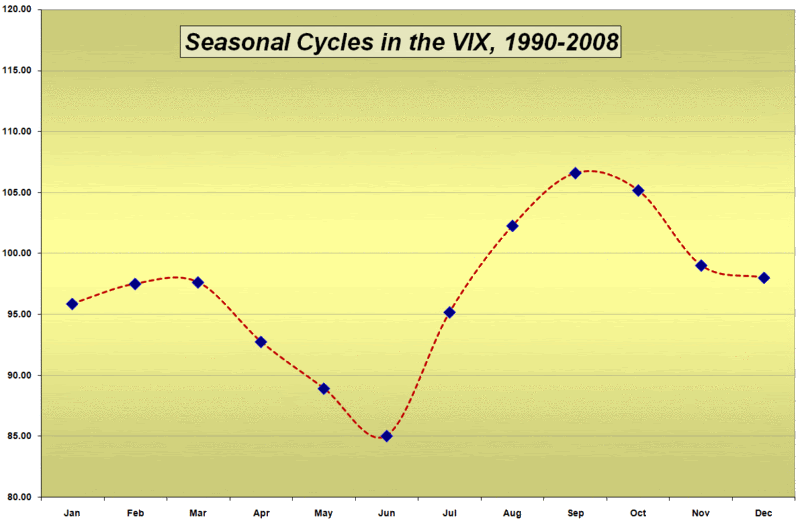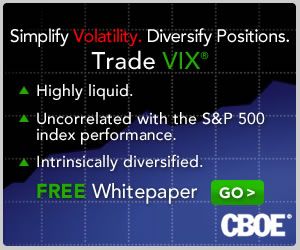The VIX Annual Cycle
Two years ago, when I was the only person reading this blog, I posted about VIX seasonal patterns in A Month By Month Look at the VIX. Since the original post I have received quite a few requests to update the chart with more recent data.
On the heels of yesterday’s VIX Holiday Crush, I am pleased to broaden the seasonal picture of the VIX with a current version of 19 years of VIX data as a composite annual cycle. The chart below has changed very little from the January 2007 version. In fact, 2008 followed the historical patterns established in previous years almost perfectly, with the VIX increasing in the January-March period, dropping through May and June, then spiking dramatically in September and October.
I have my doubts about whether this pattern will play out in future years, but the more times volatility wanders down this same seasonal path, the more time traders will be looking for a repeat in the following year.

[source: VIX and More]


11 comments:
Hi Bill, I've noticed a number of comments in the blogs (Argus for example) where the decline in the VIX worries people that another stock decline is ahead. But I thought we wanted the VIX to decline down from the extreme? Seems to me to be a sign of healing and potential strength ahead for stocks. What do you think? Also, hope you have a terrific holiday! (I know it is cold and rainy there in Marin.)
Hi HC,
First, thanks for a great year of cranking out ideas on your part. Ironically, I was just contemplating Tuesday Interest Rates and the US Dollar when your comment popped up on my screen.
The question you raise is one I have been pondering for awhile now and have seen no more than one or two other people reference. Normally, I think of the VIX in largely contrarian terms, but lately I have been thinking of it in the same 'healing' context that you cite. After such a sharp drop in the markets and fears that global financial institutions were about to collapse, I see much of the dropping VIX as a sign that investors are finally gaining confidence that government intervention (and/or market forces) is working to stem the tide and begin to give banks, corporations, municipalities, individuals, etc. an opportunity to reposition themselves not just for survival, but to be effective in an economy with new rules.
The question I have been struggling with is one of how do I know when we have transitioned from healing to some sort of exaggerated optimism that thing are going to only get better going forward.
Feel free to chime in with any thoughts you have on the subject.
Finally, it is cold and wet here in Marin, after a delightfully sunny and mild first half of December. Any chance you and I share the same local weather?
Cheers and happy holidays,
-Bill
Happy Holidays Bill!
Thanks for all the great posts and beautiful charts!
Merry Christmas and Happy New Year BILL. Thanks for all your hardwork.
Merry Xmas, Bill
I think VIX itself is not important. I think your idea of VIX/VXV ratio plays a more important part. In the last couple of weeks, we have seen the market did not response to bad news anymore. In fact, the bad news are still pouring down but the market rallied.
What is high and what is low. It is all about how to compare it. If you compare VIX with its historical value, then it is high. But if you compare it with VXV, then we have another aspects of what the market thinks.
I have thought about the failure of the ratio after Lehman. The market was too panic that they sold everything they could. There was a fear of Roubini's "mother of all banks run". And fear of the finance system totally collapsed. Such instance, I don't think we will see it very often, probably 50 years or more. In fact, the market cannot afford to have such instance happened too often otherwise, we will all be Iceland.
Bill, not sure if you have already thought about this, (I am relatively new).
TED spread has recently dropped down but still higher than the normal level. It is quite similar to VIX. As TED is a measure of 3 months T-Bill and 3m Libor, TED is a good measure of fear too. Not sure if VIX futures leads TED or vice versa.
Just my two cents.
mL
Thanks for all the well wishes, everyone.
Regarding the VIX:VXV ratio and Iceland, you and I are thinking similarly on just about every point you made.
mL,
I agree about the value of the TED spread as a credit measure of fear that is not too dissimilar to what the VIX measures. In fact I discussed the VIX and TED spread in Wednesday's subscriber newsletter, noting some of the similarities and differences between them, pointing out which has led and lagged important events, etc.
If the TED spread starts to spike again, it is something I will be talking about here.
Cheers,
-Bill
Hi Bill, I do live nearby in the bay area. I can't say I'm fond of the cold and rain, but then I watch the news of the cold, snow, and ice in the rest of the country and appreciate what we have here.
Regarding the VIX, glad to hear you are also encouraged by the gradual decline. I'm wondering if trying to use sentiment indicators under the current market circumstances is too difficult.
I'm thinking its time to go back to basics and use the 50 and 200-day moving averages to tell the story about the market.
Sourceclick for info find thisdig this check my blogRead Full Article
read the full info here dolabuy.co have a peek at this web-site Ysl replica handbags navigate to this website company website
find more Dolabuy Chrome-Hearts you can try this out aaa replica bags see this website Dolabuy Valentino
Post a Comment